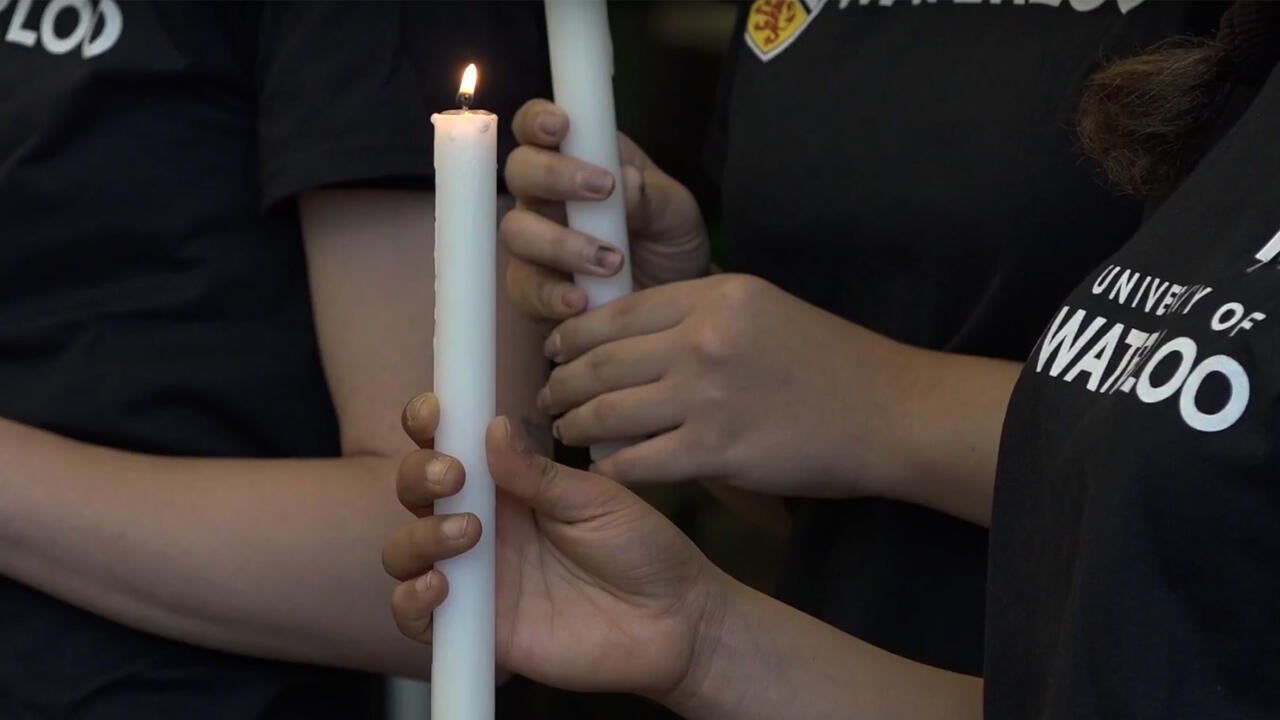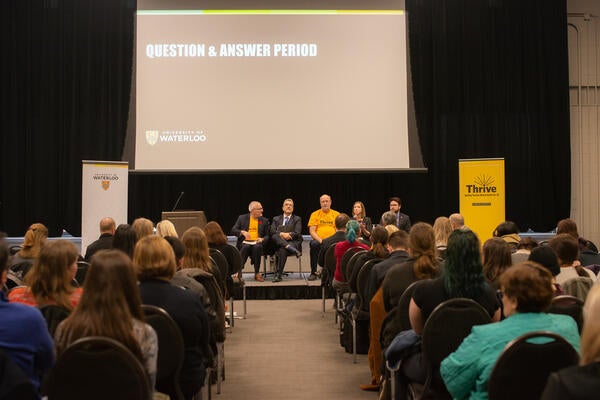
Remembering the 14 women tragically murdered 30 years ago
The University will honour the young women with a ceremony of remembrance and a beam of light cast into the sky

The University will honour the young women with a ceremony of remembrance and a beam of light cast into the sky
By Carol Truemner Faculty of EngineeringEllen McGee was sitting in her Oakville Grade 10 history class when she first heard about the mass shooting of 14 young women at l'École Polytechnique de Montréal.
The senseless act of targeted violence on December 6, 1989 both stunned and saddened McGee who was born 10 years later in 1999.
“I was shocked that someone could hold anger inside of him and then act upon it in the terrible way he did by taking it out on women,” said the second-year systems design engineering student and president of Waterloo Engineering Society (EngSoc) 'B'. “I think it was the first time I realized that the world was a bigger place and people could discriminate against you because of your gender.”
She will be reminded of her high school history lesson today when she takes part in the University of Waterloo’s National Day of Remembrance and Action on Violence Against Women ceremony of remembrance taking place in the second floor atrium of Engineering 7 at 10:30 a.m.
McGee and 13 other engineering students will light a candle honouring each woman murdered.
Speakers at the event include Feridun Hamdullahpur, the University’s president and vice-chancellor, Diana Parry, the University’s associate vice-president human rights, equity and inclusion, and Pearl Sullivan, dean of Waterloo Engineering. Sullivan, who was a graduate student at the University of British Columbia in 1989, remembers the horror she felt when watching the news coverage of the murders.
“Canadians woke up that day to a changed world,” she said. “As a nation of action, we implemented new laws, we brought domestic violence to the forefront, we built programs to improve women’s safety – although there is still more to be done here – and we made this day, December 6, a day of national remembrance.”
In addition to its annual national day of remembrance ceremony, the University will join 13 other post-secondary institutions in shining a beam of light into the sky to commemorate the 30th anniversary of the tragedy.
Starting at 5 p.m., the light will be cast outside of Engineering 5. Students, staff, faculty members and others walking past it are requested to pay tribute to the victims with a moment of silence.
Engineering students from across the country are also marking the somber 30th anniversary by designing and assembling a puzzle.
University of Waterloo EngSoc executives and other engineering students will work over the next few weeks to brainstorm ideas and then create one, possibly two, .3 by .3 metre pieces for the puzzle.
Early next month, McGee and other EngSoc members will attend the Canadian Engineering Leadership Conference at the University of Alberta where they’ll add the pieces produced by Waterloo students to those created by other Canadian engineering students. A white ribbon will be added over the assembled puzzle, which will then be donated to l’École Polytechnique de Montréal.
The events taking place to remember what happened 30 years ago are a reminder of how far society has come since then and how far we still have to go to ensure everyone feels comfortable in STEM (Science, Technology, Engineering and Math) programs, said Chukwunonso Moneme, vice-president communications for EngSoc ‘B’.
“There are still too many people facing harassment and violence due to their gender and until these incidents are rare to none, we can’t say that there isn’t more work to be done,” said Moneme, a second-year chemical engineering student. “That’s why it’s so important to look at the culture we foster at our schools and the culture we support in the workplace.”
Moneme praises Waterloo Engineering’s programs including Women in Engineering established to address issues faced by female engineers and to encourage more young women to pursue engineering and better reflect the gender ratio of the general population within the profession.
Campus-wide, the University is involved in the United Nations Women’s HeForShe IMPACT 10x10x10, a global effort to engage men and boys in removing the social and cultural barriers that prevent women and girls from achieving their potential. As part of this initiative, the University aims to increase representation for women or those who identify as women and non-binary in STEM education and careers.
McGee feels lucky to have grown up feeling supported by her family, teachers and others.
“I grew up in a community where I always felt I could do whatever I wanted to do, including pursuing a career in STEM,” she said. “I never felt that as a woman I couldn’t do something.”
Today, McGee said she’s “proud to be a woman in engineering.”
“I’m happy to be able to be learning in a community and at a University that supports women in engineering. I know there are still challenges that women face in this field, but I’m thrilled to be here.”

Read more
Strategic Plan 2020-2025 will guide Faculty for next five years

Read more
Ahead of Remembrance Day, Veteran Matt Austin (BA ’10) reflects on the personal cost of war

Read more
Thrive week events shed light on progress of campus wellness initiatives
Read
Engineering stories
Visit
Waterloo Engineering home
Contact
Waterloo Engineering
The University of Waterloo acknowledges that much of our work takes place on the traditional territory of the Neutral, Anishinaabeg, and Haudenosaunee peoples. Our main campus is situated on the Haldimand Tract, the land granted to the Six Nations that includes six miles on each side of the Grand River. Our active work toward reconciliation takes place across our campuses through research, learning, teaching, and community building, and is co-ordinated within the Office of Indigenous Relations.